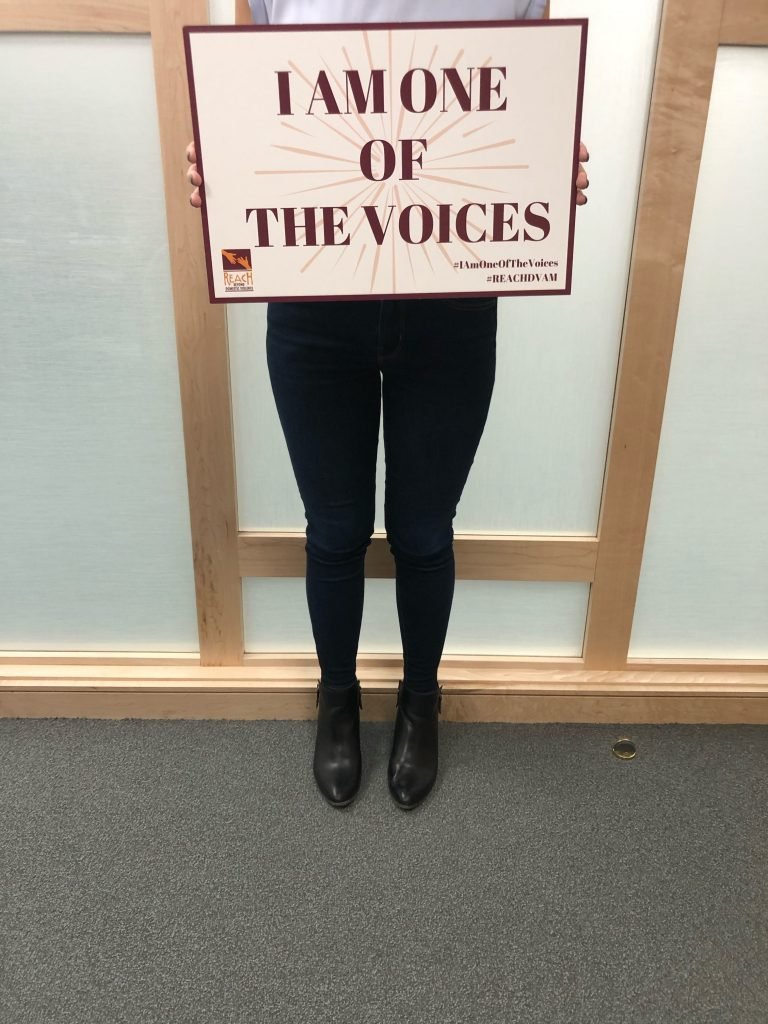By a REACH Staff Member
What happens to a voice when it is repeatedly silenced? What happens when the body that houses that voice learns it will be harmed and discounted? What happens when cooperation and silence are implicit and saturate the very air we breathe? It has been a lifelong journey of learning how to access the words that had settled at the base of my throat, making a home there. Towards the beginning, when it was all coming to the surface it felt like breaking more than healing… like having to re-break a bone that set incorrectly. But I had to find those words, re-open the wound, re-break the bone in order to access healing. It has been slow, it has been gritty. It has been a continual process of giving myself permission to speak and give voice to the parts that need it the most.
Using our voices is one form of activism. Another, is listening. Listening in a way that is not waiting to defend, to combat, or to judge. Listening in a way that allows us to suspend our own beliefs for a moment, to open ourselves up to the fact that others around us move through this world in ways we may have never considered, and perhaps will never experience personally. We can become so entrenched in our own worlds, that we ignore the validity of another’s. As an advocate, a significant portion of my time is spent listening. I am listening to the experiences of survivors. I am listening to policy makers, educators, co-workers, friends, and family. I am listening to what is being said as much as what is not being said. I am thinking about what experiences are not being shared or heard within the walls of my religious community, my school, work, and home. What voices are being turned up to a higher volume because of sexism and racism–as well as other forms of oppression–that are woven into the very fabric of our social structure, designed specifically to amplify certain voices?

Domestic violence awareness month (DVAM) is a time for thoughtful conversation about the existence of violence in our communities. It can be a time to reflect on those who have been impacted by domestic violence, and to break open and discard the belief that we have no role in this. We have historically marginalized domestic violence as something ‘other’–not our problem, not our family, not our community– but even though domestic violence occurs between individuals, it is perpetuated by systems that uphold certain values, while ignoring others. DVAM is a time to not only increase our awareness, but to learn about what we each can do to address it. This can mean lobbying at the state house for policies that would increase access to community resources and victim services. It can mean voting people into office who will expand the rights of marginalized groups. It can mean adopting school curriculum that includes comprehensive sex education as well as topics on healthy relationships, warning signs of abuse, boundaries, and consent.
Domestic violence occurs between individuals, but it must be eradicated by transformed values and social systems. The trauma of domestic violence expands outward to children, parents, siblings, friends, co-workers, and classmates; creating an action call for each of us because if it’s in all of our communities, then a communal response is demanded. It is the values we instill in children, the gender dichotomy we assign weighted value to, the undercurrent of aggression or submission that we subscribe to in our relationships. It is how we conceptualize and talk about consent and boundaries.
This month we can reflect on and celebrate the strides we have made, and recognize and act on the belief that violence occurs in relationships and that we have a responsibility to respond. May we think more consciously about those around us. May we pay attention and inquire with genuine care. May we be mindful that so many people move through this world very differently from ourselves. May we be aware and responsive to the fact that while we all have voices, some have had theirs silenced by shame, stigma, and trauma, and that by listening to those voices, we can continually work towards a movement and a world that is inclusive and ever evolving as we learn.





